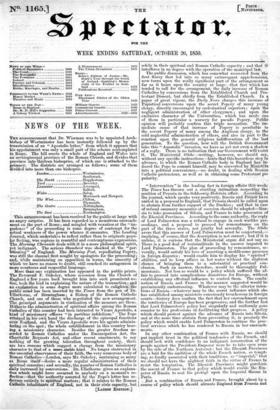NEWS OF THE WEEK.
Tice announcement that Dr. Wiseman was to be appointed Arch- bishop of Westminster has been instantly followed up by the transmission of an " Apostolic letter," from which it appears that his appointment was only a small part of the scheme contemplated in Home. The bill erects the whole of England and Wales into an arehiepiincialproirince of the Roman Church, and divides that province Into" thirteen. bishoprics, of which one is attached to the primacy. The districts are arranged as follows ; some of them
divided into more than one bishopric
London Westminster,
Southwark.
The North Hagglestone. York Beverley. • Lancaster Liverpool,
Salford.
Walk .Salop,
Merioneth and Newport.
The West Clifton,
Plymouth.
The Centre Nottingham,
Birmingham, ,
The East Northampton.
This announcement has been received by the public at large with an angry surprise. It has been regarded as a monstrous encrOach- ment on the part of Rome ; and mingled with vexation at the " im- pudence " of the proceeding is some degree of contempt for the actual weakness of the power whence it emanates. The Leading Journal, which undertakes to reflect rather than to originate popu- lar feeling, *as copious in resentful and contemptuous expressions. The Morning Chronicle deals with it in a more philosophical spirit, yet indignant. The serious Standard was shocked at the " par- titioning' of England. The Morning Post, repudiating Popery, was still the channel first sought by apologists for the proceeding; and,. u•hile maintaining an opposition in terms, the sincerity of which we have no. reason to doubt, still couched its antagonism in
more courteous and respectful language. • • More than one explanation has appeared in the public prints.
The Reverend F. Oakeley, whose secession from the Church of England a few years back brought him into such prominent no- tice, took the lead in explaining the nature of the transaction ; and an explanation in some degree more calculated to enlighten-_the public mind has been inserted by the Times from the pen of Dr. Ulathorne, of Birmingham; a Bishop of the Roman Catholic Church, and one of those who negotiated the new arrangenient. The principal arguments in vindication of the measure are these., Hitherto the administration of spiritual affairs among the Roman Catholics of this country had been intrusted to 'Vicars Apostolic, a kind of missionary officers " in partibus infidelium." -The-Pope retained in his own hand the discharge of the episcopal functions over England, and the Vicars Apostolic were his agents adminis- tering on the spot ; the whole establishment in this country bear- ing a missionary character. Besides the greater freedom ac- corded to Roman Catholics under the Emancipation Act, the Charitable Bequests Act, and other recent enactments, to say nothing of the growing toleration throughout society, there are two reasons which suggest a change from the missionary character to that of a mere stable kind. No longer obstructed in the essential observances of their faith, the very numerous body of Roman Catholics—London, says Mr. Oakeley, containing as many as Rome itself—desire a more regular administration of their spiritual concerns ; and secondly, the number of Roman Catholics is daily increased by conversions. Dr. Ullathorne gives an explana- tion which might have occurred to anybody on a moment's re- flection—that the authority asserted by, the Pope's letter has re- ference entirely to spiritual matters;. that it relates to the Roman Catholic inhabitants of England, not in their civic capacity, but
r-s 7•-• - — -
solely in their spiritual and Roman Catholic capacity.; and that it interferes in no degree with the operation of the municipal law. The public discussion, which has somewhat recovered from the first flurry that led into so many extravagant apprehensions, now turns upon the really significant part of the arrangement so far as it bears upon the country at large—that fact which has tended to call for the arrangement, the daily increase of Roman Catholics by conversions from the Established Church and Pro- testant Dissent, but chiefly from the Established Church. In a paper of great vigour, the Daily News charges this increase of 1)apistical conversions upon the secret Popery of many young de , directly. encouraged by ecclesiastical superiors ; upon the negligent administration of other clergymen.; and upon the exclusive character of the Universities, which has made one of them in particular a nursery forseudo Popery. PUblic opinion will probably confirm this tri o accusation. • The im- mediate cause of that increase of opery is ascribable to the covert Popery of many among the Anglican clergy, to the cold neglectful administration of others, and also in part to the reaction upon the general religious indifferentism of the last generation. To the .question, how will the British GovernMent take this " Apostolic invasion, we have as yet not even a shadow of a reply. There is no indication that our Government will resist it. The Ministerial Globe—writing, however, we should say, without any specific instructions—hints that this hazardous step 1n advance, to which the Roman Catholic body in England has in- duced the Pope to commit hintlelf, may be converted by Ministers into a political convenience,—no doubt, in dealing with Roman Catholic pretensions, as well as in obtoiniug some Protestant po- pularity.


























